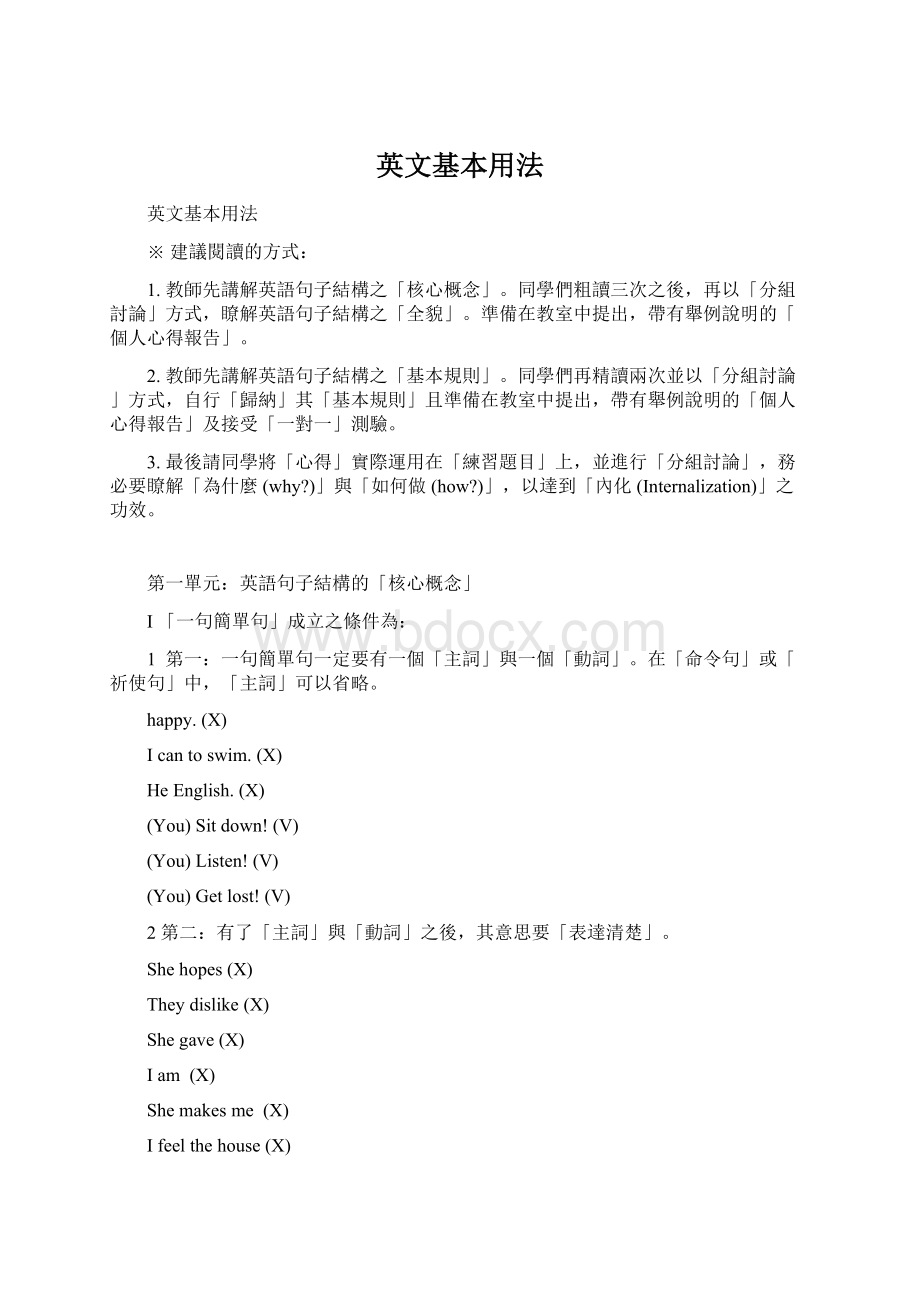英文基本用法.docx
《英文基本用法.docx》由会员分享,可在线阅读,更多相关《英文基本用法.docx(39页珍藏版)》请在冰豆网上搜索。

英文基本用法
英文基本用法
※建議閱讀的方式:
1.教師先講解英語句子結構之「核心概念」。
同學們粗讀三次之後,再以「分組討論」方式,瞭解英語句子結構之「全貌」。
準備在教室中提出,帶有舉例說明的「個人心得報告」。
2.教師先講解英語句子結構之「基本規則」。
同學們再精讀兩次並以「分組討論」方式,自行「歸納」其「基本規則」且準備在教室中提出,帶有舉例說明的「個人心得報告」及接受「一對一」測驗。
3.最後請同學將「心得」實際運用在「練習題目」上,並進行「分組討論」,務必要瞭解「為什麼(why?
)」與「如何做(how?
)」,以達到「內化(Internalization)」之功效。
第一單元:
英語句子結構的「核心概念」
I「一句簡單句」成立之條件為:
1第一:
一句簡單句一定要有一個「主詞」與一個「動詞」。
在「命令句」或「祈使句」中,「主詞」可以省略。
happy.(X)
Icantoswim.(X)
HeEnglish.(X)
(You)Sitdown!
(V)
(You)Listen!
(V)
(You)Getlost!
(V)
2第二:
有了「主詞」與「動詞」之後,其意思要「表達清楚」。
Shehopes(X)
Theydislike(X)
Shegave(X)
Iam(X)
Shemakesme(X)
Ifeelthehouse(X)
3第三:
句子「主詞」與「受詞」的「詞類」一定是「名詞」或「名詞相等詞」。
---Richdon’tlikethepoor.(X)
Smokeisharmfultoyourhealth.(X)
Happyisthemotherofhealth.(X)
---Weshouldrespectpoor.(X)
Helikeslistentomusic.(X)
Helpisthemotherofhappy.(X)
II「簡單句」分類圖
簡單句
動詞
不及物及物
動詞動詞
完全不及物連綴完全及物授與不完全及物
主詞動詞動詞動詞動詞動詞
(1)
不需耍
受詞
名詞
或
名詞相等詞
(5)
需要受詞及
受詞補語
(4)
需要
兩個受詞
(3)
只需要
一個受詞
(2)
不需要受詞但需要
主詞補語
III對等子句結構圖
簡單句
簡單句
對等連接詞
++
HelikesapplesbutIlikeoranges.
Sheisbeautifuland(sheis)kind.
IV名詞子句結構圖
主詞+動詞+…
1.Itistrue.
附屬連接詞+簡單句
+動詞+…
2.Thattheearthisroundistrue.
主詞+動詞+受詞
3.Theteacherlikesus
附屬連接詞+簡單句
主詞+動詞+
4.Theteacherlikesthatwecouldstudyharder.
主詞+動詞+主詞補語
5.Loveiswonderful.
附屬連接詞+簡單句
主詞+動詞+
6.Loveisthatwecantakecareofeachother.
V形容詞子句結構圖
主詞+動詞+主詞補語
1.Heisaman.
附屬連接詞+簡單句
主詞+動詞+主詞補語
2.Hewhocanlovehisfamilyisaman.
主詞+動詞+受詞
3.Shehasadog.
附屬連接詞+簡單句
主詞+動詞+受詞
4.Shehasadogwhichshelikesverymuch.
VI副詞子句結構圖
簡單句
附屬連接詞+簡單句,
+
1.IfIwereyou,Iwouldstudyharder.
簡單句
附屬連接詞+簡單句
+
2.IwouldstudyharderifIwereyou.
VII英文五個簡單句的組合「單元」。
1主詞(Subject,S.):
主詞是「動詞」的「主人」。
依簡單句成立之「第一條件」,其「詞類」一定要用「名詞」或「名詞相等詞」。
workshard.(X)→Maryworkshard.
likesswimming.(X)→Shelikesswimming.
don’tlikethepoor.(X)→Therichdon’tlikethepoor.
willbetakengoodcare.(X)→Thewoundedwillbetakengoodcare.
isharmfultoyourhealth.(X)→Tosmokeisharmfultoyourhealth.
isharmfultoyourhealth.(X)→Smokingisharmfultoyourhealth.
ismyworkinghour.(X)→From8to5ismyworkinghour.
puzzledme.(X)→HowIshouldsaytomywifepuzzledme.
Theearthisroundistrue.(X)→Thattheearthisroundistrue.
Goshoppingismyhobbit.(X)→Goingshoppingismyhobbit.
Playgamesmakesmehappy.(X)→Playinggamesmakesmehappy.
2動詞(Verb,V.):
動詞是「主詞」的「動作」或「狀態」。
以有無動作來區分,動詞分為「be動詞」與「do動詞」。
---be動詞(be,is,are,am,was,were):
它不表示主詞的「動作」,而表示其「存在」。
其功能之一是為了符合了簡單句成立的第一條件「一句簡單句一定要有一個動詞」。
---他們餓了。
Theyhungry.(X)→Theyarehungry.
---我興奮了。
Iexcited.(X)→Iamexcited.
---她很高。
Sheverytall.(X)→Sheisverytall.
---我媽媽很瘦。
Mymotherverythin.(X)→Mymotherisverythin.
---他很快樂。
Heveryhappy.(X)→Heishappy.
---do動詞:
表示主詞的「動作」。
IMary.(X)→IlikeMary.
Heherverymuch.(X)→Helikesherverymuch.
Hemeonthehead.(X)→Hehitmeonthehead.
3受詞(Object,O.):
「動詞」或「介系詞」的「動作接受者」,稱之為「受詞」。
主要的功能在使「動詞」或「介系詞」之意思「表達清楚」。
其詞類一定要是「名詞」或「名詞相等詞」。
Hewrote(X)→Hewrotealetter.
Iknow(X)→Iknowhim.
Weshouldrespect(X)→Weshouldrespectthepoor.
Thenurseistakingcareof(X)→Thenurseistakingcareofthewounded.
Helikes(X)→Helikestolistentomusic.
Ienjoy(X)→Ienjoywatchingafootballgame.
Arabbitranoutof(X)→Arabbitranoutofthebush.
Idon’tknow(X)→Idon’tknowwhatIshoulddo.
Helikeslistentomusic.(X)→Helikestolistentomusic.
Ienjoywatchafootballgame.(X)→Ienjoywatchingafootballgame.
Servicebegetshappy.(X)→Servicebegetshappiness.
4直接受詞(DirectObject,D.O.)與間接受詞(IndirectObject,I.O.):
如果動詞的「一個受詞」,無法將意思「表達清楚」,則需要「另一個受詞」。
這兩個「受詞」中,「動作的第一個接受者」稱為「直接受詞」;「第二個者」為「間接受詞」。
造句時,可以寫成「間接受詞」+「直接受詞」或「直接受詞」+「介系詞:
to,for,of,from,on,by,at等等」+「間接受詞」。
Bringmesomewater.→Bringsomewatertome.
Iwillbuildyouanewhouse.→Iwillbuildanewhouseforyou.
Iaskedhimaquestion.→Iaskaquestionofhim.
Heplayedmeatrick.→Heplayedatrickonme
Hethrowsthedogabone.→Hethrowsaboneatthedog.
5及物動詞(TransitiveVerb,Vt.)與不及物動詞(IntransitiveVerb,Vi.):
如果動詞的意思已「表達清楚」,就不需要「受詞」,該動詞稱為「不及物受詞」。
若動詞的意思無法有無「表達清楚」,就需要「受詞」來協助,使意思「表達清楚」,此類動詞稱為「及物受詞」。
因所表達之意思不同,有些「動詞」可能具有上述「兩種身份」。
---Dogsbark.
Timeflies.
Thesunisrising.
---Thenewsexcited…→Thenewsexcitedme.
Weshouldrespect…→Weshouldrepecttheold.
Hehates…→Hehatesstudyingmath.
Thebookbored…→Thebookboredthestudents.
---Iplayvideogameseveryday.(及物動詞)
Tomisplayingintheplayground.(不及物動詞)
6主詞補語(SubjectComplement,S.C.):
由「主詞」+「連綴動詞」組成的句子中,使別人不清楚意思地方是,「主詞的狀態」或「身份」,因此需要一些字來補充說明主詞之「狀態」或「身份」,這些字稱為「主詞補語」。
說明主詞狀態用「形容詞」來敘述;說明其身份用「名詞」。
Heappears→Heappearshonest.(狀態)
(You)keep,please.→(You)keepsilent,please.(狀態)
Youlook.→Youlooktired.(狀態)
Weare→Wearefamily.(身份)
Iam.→Iamamanager.(身份)
7受詞補語(ObjectComplement,O.C.):
由「主詞」+「及物動詞」+「受詞」組成的句子中,如果「受詞」的意思表達不清楚,則需要一些字補充說明「受詞」的「意思」,這些字稱為「受詞補語」。
Ipaintedthehouse…→Ipaintedthehousegreen.
Icouldn’tpersuadeher…→Icouldn’tpersuadehertomarryme.
Remindhim…→Remindhimtocomehomeearly.
Doyoutakeme…?
→Doyoutakemeforafool?
Itoldhernot…→Itoldhernottoanswerquestions.
Letme…→Letmehaveatry.
Youmaycallme…→Youmaycallme“Nobody”.
Thejokesetthem…→Thejokesetthemlaughing.
VIII簡單句「第一句型」:
「主詞」+「不及物動詞」
1下列句子是此句型的範例,它們之所以成立是因為合乎簡單句成立之條件:
「有一個主詞、一個動詞」、「主詞與動詞的意思表達清楚」以及「主詞與受詞」的「詞類」一定要是「名詞」或「名詞相等詞」。
Dogsbark.
Birdssing.
Timeflies.
2主要意思完整的句子,可加以修飾得更清楚,其主要方法有三:
以「副詞」、「介系詞片語」或「不定詞片語」修飾「動詞」或「全句」,以表達「如何(how?
)」、「地點(Where?
)」、「時間(When?
)」
Dogsbarkfiercely.(How?
)
Birdssingincomfort.(How?
)
Thesunrisesintheeast.(Where?
)
Timeflieslikeanarrow.(How?
)
Weeattolivenotlivetoeat.(How?
)
Igotupatsixo’clockthismorning.(When?
)
IX簡單句「第二句型」:
「主詞」+「不及物動詞」+「主詞補語」
1此句型的「不及物動詞」又稱「連綴動詞」,主要的有:
Be,appeartobe,bear,continuetobe,die,feel,go,keep,lie,look,read,remain,seemtobe,sit,smell,sound,stand,taste
Therosesmells.(X)→Therosesmellssweet.
Itmaysoundbutitis(X)→Itmaysoundstrange,butitistrue.
Thisfruittastes(X)→Thisfruittastessour.
Hestands(X)→Hestandsstill.
Seeingis(X)→Seeingisbelieving.
2修飾此句型的主要方法有三:
以「副詞」、「介系詞片語」或「不定詞片語」修飾「形容詞」、「名詞」或「全句」。
Heisfrightenedseriously.
Iamgladtoseeyou.
Hedidn’tcometoseeme.
Weeattolivenottolivetoeat.
Hewasanxiousformeetingyou.
IamastudentinYuDa.
Iagreewithyou.
Iapologizeforbeinglate.
Heaskedaboutyou.
Hecomplainedabouthighprices.
X簡單句「第三句型」:
「主詞」+「及物動詞」+「受詞」
1在下列動詞之後,如果以「動詞」作為「受詞」,一定要將它改變成【名詞相等詞「不定詞」】:
Afford,agree,appear,arrange,ask,beg,care,choose,consent,dare,decide,expect,fail,happen,help,hesitate,hope,learn,manage,mean,neglect,offer,prepare,pretend,promise,refuse,seem,swear,trouble,want,wish
Thisbookisdear;Icannotaffordtobuyit.
Hearrangedtomeetherattherestaurant.
Hedidn’tchoosetoanswer.
Heconsentedtogo.
Doyoudaretofightagain?
2在下列動詞之後,如果以「動詞」作為「受詞」時一定要將它改變成【名詞相等詞「動名詞」】:
Admit,anticipate,avoid,complete,confess,consider,contemplate,defer,delay,deny,detest,dislike,endure,enjoy,escape,excuse,fancy,feellike,finish,forgive,can’thelp,havedone(=finish),hinder,imagine,involve,mind,miss,pardon,postpone,practice,prevent,resent,notresist,risk,nottolerate,can’tstand,suggest,can’tunderstand
Noonewilladmithavingdoneit.
Sheanticipatesfindingajob.
Youmustavoidoffendinghim.
Iwillcompletewritingthisletterfirst.
IamconsideringgoingtoParis.
Hedelayedansweringtheletter.
Idetesteatingalone.
Hedislikesgoingtoschool.
Ienjoy(myselfat)watchingthegame.
Pleaseexcusemybeinglate.
Ican’tfancyhisdoingsuchathing.
Ifeellikeeatingabigmeal.
Ifinishreadingabook.
XI簡單句「第四句型」:
「主詞」+「及物動詞」+「間接受詞」+「直接受詞」
1此句型主要的及物動詞有:
Ask,bring,build,buy,call,choose,cook,cost,deny,do,fetch,get,give,hand,leave,lend,make,offer,order,owe,pass,pay,play,promise,reach,read,refuse,sell,send,show,sing,spare,take,teach,tell,write
Sheaskedmeaquestion.
Whathasbroughtyouhereatthistimeoftheday?
Iwillbuildyouanewhouse.
Sheboughtmeadrink.
Callmeataxi.
Iwillcookyousomethingforsupper.
Thebookcostsmetendollars.
Iwillgethimawatch.
Thesungivesuslightandheat.
Helefthiswifealargefortune.
Canyoulendmeyourknife?
Cometokitchen,Iwillmakeyousomecoffee.
Heofferedheracigarette.
HowmuchdoIoweyou?
Iwillpayyouavisittomorrow.
Hepromisedheradiamond.
Pleasereachmethenewspaper.
2某些第四句型可寫成:
主詞+及物動詞+直接受詞+to+間接受詞。
「to」表示「對象:
對、向」。
有些動詞只能使用此句型,例如:
Explain,confess,admit,announce,declare,demonstrate,describe,entrust,introduce,mention,propose,prove,repeat,report,say,suggest等等。
Bringsomewatertome.
Pleasefetchthebooktome.
Shewritesalettertohim.
Ihavesentatelegramtohim.
Heexplainedthesituationtome.
Heconfessedhiscrimetothecourt.
3下列動詞所造的句子可寫成:
主詞+及物動詞+直接受詞+for+間接受詞:
Build,buy,call,choose,cook,do,get,leave,make,order,reach,sing,spare。
「for」表示「代表(onsomeone’sbehalf)」或「代替(insteadof)」。
Iwillbuildanewhouseforyou.
Sheboughtadictionaryforherbrother.
Callataxiforme.
Shetookalongtimetochooseahatforherself.
Iwil